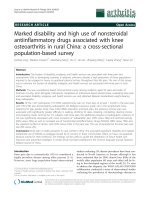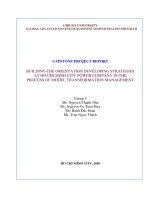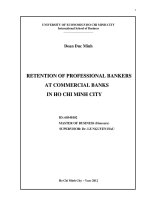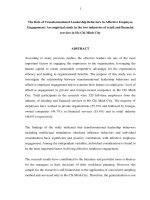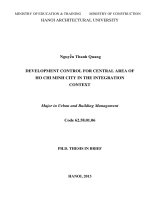Determination of Non-Steroidal Anti-Inflammatory Drugs (Nsaids) in Surface Water at Ho Chi Minh City
Bạn đang xem bản rút gọn của tài liệu. Xem và tải ngay bản đầy đủ của tài liệu tại đây (263.37 KB, 6 trang )
VNU Journal of Natural Sciences and Technology, Vol. 30, No. 1 (2014) 7-12
7
Determination of Non-Steroidal Anti-Inflammatory Drugs
(Nsaids) in Surface Water at Ho Chi Minh City
Đỗ Vũ Hoàng Anh
1,
*, Bùi Quang Minh
1
, Nguyễn Duy Linh
1
, Phạm Hồng Nhật
2
1
Institute of Environment Technology, Vietnamese Academy of Science and Technology
2
Vietnam Institute for Tropical Technology and Environmental Protection (VITTEP)
Received 05 November 2013
Revised 19 November 2013; accepted 28 November 2013
Abstract: This study aims at setting up an analytical method for determination of 4 Non-Steroidal
Anti-Inflammatory Drugs (NSAIDs) including ketoprofen, ibuprofen, diclofenac sodium and
mefenamic acid in surface water. The method studied involved solid phase extraction (SPE) using
Poly-Sery PSD (Poly styrene divinylbenzene) SPE catridge and analysis by high-performance
liquid chromatography (HPLC) with DAD detector. The recoveries were found in the range of
82% - 98% with relative standard deviations (RSD) of less than 10% and method detection limits
(MDL) were from 0.004 to 0.015µg/L. This method was used to determine the selected
compounds in fifteen surface water samples collected in Ho Chi Minh City. The analysis results
show that their residues currently do exist in surface water in the study area.
Keywords: NSAIDs, HPLC-DAD, surface water.
1. Introduction
∗
∗∗
∗
Pharmaceuticals and Personal Care
Products (PPCPs) residues present in the
environment are now common and recognized
as a problem. Thousands of ton of
pharmacologically active substances are used
every year over the world to fight diseases or to
face the stresses of modern life. Studies
conducted in Australia, Brazil, Canada, Croatia,
England, Germany, Greece, Italy, Spain,
Switzerland, the Netherlands and the United
States had found the presence of more than 80
compounds including pharmaceuticals and its
_______
∗
Corresponding author. Tel: 84-1219333718.
E-mail:
metabolites in aquatic environment [1].
Remarkably, Non-Steroidal Anti-Inflammatory
Drugs (NSAIDs) are increasingly identified in
the environment from various sources. These
NSAIDs account for many cases of ulcers, or
intestinal perforation in chronic users for pain
and inflammation. Therefore, PPCPs in general
and NSAIDs residues in particular in
environment, especially in water environment,
should gain better attention from us all. In this
context, there is a clear need of an analytical
method with proper accuracy and precision to
monitor these compounds residues in water
environment.
Currently, there are various methods
available to identify NSAIDs in the world such
Đ.V.H. Anh et al. / VNU Journal of Natural Sciences and Technology, Vol. 30, No. 1 (2014) 7-12
8
as: gas chromatography-mass spectrometry
(GC/MS) combined with derivatives obtained
from previous step; liquid chromatography-
mass spectrometry (LC/MS, LC/MS/MS); high
performance liquid chromatography with UV
and fluorescence detector (HPLC/UV/FL);
capillary electrophoresis (CE) methods etc.[2].
Bearing in mind that most of laboratories in
Vietnam are not modernly equipped, in this
study, we use HPLC/UV to determine the four
common NSAIDs which are ketoprofen,
ibuprofen, diclofenac sodium and mefenamic
acid.
2. Materials and methods
2.1. Sampling
Samples were collected at the depth of 0.25
to 1.0 meter from the surface of water and
stored in 2.5-liter amber glass bottles at 4
o
C
until sample treatment [3].
Fifteen surface water samples at Hồ Chí
Minh City were collected on 23 September
2013.
2.2. Sample preparation and analysis
2.2.1. Chemicals and reagents
Chemicals and reagents used in the study
included acetonitrile (Labscan), methanol
(Merck), hexane (Labscan), ethyl acetate
(Merck) , acetic acid (Merck), ultrapure water
(Millipore), ketoprofen, ibuprofen, diclofenac
sodium and mefenamic acid standard (IDQC,
purity >99.9%).
Stock solutions of 1,000mg/L were
prepared in methanol and stored at 4
0
C.
Working solutions were prepared by diluting
the stock standard solutions in methanol [4].
2.2.2. Instrument
Extraction was performed on solid phase
extraction system (Agilent) with vacuum pump
and Poly-Sery PSD (Poly styrene
divinylbenzene) SPE tubes (250mg, 6mL) of
DNW Technologies GmBh.
Chromatographic analysis was performed
on a LaChrom Hitachi HPLC instrument.
Separations were carried out using an Inspire
C18 (250mm x 4.6mm i.d., 5µm) column
protected by an Inertsil ODS-3 (10mm x 4.0mm
i.d., 5µm) guard column.
2.2.3. Sample preparation
Samples were filtered through a 0.45µm
cellulose acetate membrane filter to remove
suspended matters. The SPE cartridges were
conditioned with 6mL ethyl acetate, 6mL
methanol, 6mL ultrapure water. 500mL samples
were then transferred to the SPE cartridges. The
loaded cartridges were rinsed with 3mL of
methanol:water (5:95, v/v) solution and 3mL n-
hexane. After the enrichment step, the
cartridges were vacuum dried. The elution was
performed with three 3-mL aliquots of ethyl
acetate. Extraction was performed under
Fig. 1. Location of sampling sites.
Đ.V.H. Anh et al. / VNU Journal of Natural Sciences and Technology, Vol. 30, No. 1 (2014) 7-12
9
vacuum at the flow rate of 3mL/min. The
effluent was dried under a stream of nitrogen.
The residues were dissolved in 0.5mL methanol
and rejected into the HPLC system [5].
2.2.4. HPLC-DAD conditions
Mobile phase (isocratic flow): 40% 1mM
Acetic acid– 60% Acetonitrile
Flow-rate: 1.0 mL/min
The UV signal of ketoprofen, ibuprofen,
diclofenac sodium, mefenamic acid were measured
at 254, 218, 276 and 218nm, respectively.
2.2.5. Calibration curve, method detection
limit and method quantitation limit
Calibration standards were prepared in the
concentration range of 10 - 2,000µg/L for
ketoprofen, diclofenac sodium, mefenamic acid
and 20 - 2,000µg/L for ibuprofen.
Method detection limit (MDL) and method
quantitation limit (MQL) were determined by
analyzing five times of spiked samples which
are prepared by adding standard solution so that
their final concentration after post-extracted are
5.0, 10.0, 20.0µg/L, respectively. Minimum
concentration (
C
min
) is chosen so that S/N
value is ranged from 3 – 10 for each
compound.
where: V = 0.5mL; V
s
= 500mL
2.2.6. Recovery
500mL aliquots of sample were spiked five
times with the pharmaceutical compounds at
three concentration levels (0.5, 2.0, 5.0µg/L).
Samples were then extracted as described
above. Signals obtained from spiked samples
were compared with signals from sample
without standard addition.
3. Results and discussions
Calibration curves were linear with
coefficients of correlation greater than 0.999 for
all the pharmaceuticals analyzed. The overall
retention time was no more than 18 min.
Fig. 2. Chromatogram of standard solution
Table 1. Method detection limit (MDL) and method quantitation limit (MQL)
of the pharmaceutical compounds in water
Pharmaceutical compound MDL (µg/L) MQL (µg/L)
Ketoprofen 0.004 0.013
Ibuprofen 0.015 0.050
Diclofenac sodium 0.010 0.030
Mefenamic acid 0.004 0.013
Đ.V.H. Anh et al. / VNU Journal of Natural Sciences and Technology, Vol. 30, No. 1 (2014) 7-12
10
The recoveries ranged from 82% to 98%
with relative standard deviations (RSD) of all
three experiment setup less than 10% (see Table
2). These data indicate that the treatment
method acquired are relatively good for the
study purpose.
Table 2. Average recoveries of the studied pharmaceutical compounds at different spiking levels (n=5)
Spiked concentration
0.5 µg/L 2.0 µg/L 5.0 µg/L
Pharmaceutical
compound
Recovery (%) RSD (%) Recovery (%) RSD (%)
Recovery (%) RSD (%)
Ketoprofen 90.0 4.52 89.8 2.90 83.5 1.68
Ibuprofen 92.0 7.16 98.0 1.59 86.8 4.39
Diclofenac sodium 91.1 8.64 95.5 4.40 82.0 4.77
Mefenamic acid 84.9 8.41 92.2 5.60 82.6 3.54
Fifteen surface water samples at Hồ Chí
Minh City were analyzed by this method.
Analytical results are shown in Table 3 and Fig.
3. The results show that residues of the
analyzed compounds do exist in the collected
water samples. Among them, mefenamic acid
concentration is higher than the others and
exists in the surface water at all sampling
locations. Particularly, ibuprofen concentration
at Lê Văn Sỹ bridge is significantly higher than
at other locations. Regarding ketoprofen and
diclofenac sodium, they only exist in surface
water at a low concentration and at a few
sampling locations.
T
able 3. Concentration of the analyzed pharmaceutical compounds
in surface water samples collected at Hồ Chí Minh City
Sampling site
River/Canal
Ketoprofen
(µg/L)
Ibuprofen
(µg/L)
Diclofenac sodium
(µg/L)
Mefenamic
acid (µg/L)
Sài Gòn bridge <MDL 0.15 <MQL 0.64
Thủ Thiêm
bridge
<MDL <MDL <MQL 0.39
Bình Triệu
bridge
Sài Gòn River
<MDL 0.48 <MQL 0.98
Khánh Hội
bridge
0.67 1.29 <MQL 0.91
Chữ Y bridge <MQL 0.37 0.04 1.67
Chà Và bridge <MQL 1.17 <MDL 2.43
Nhị Thiên
Đường bridge
<MDL <MQL <MQL 0.88
Nguyễn Tri
Phương bridge
<MQL 1.79 <MDL 2.14
Ruột Ngựa small
canal
<MQL 1.21 <MDL 3.40
Phú Định ferry
Bến Nghé – Tàu Hủ –
Đôi– Tẻ
<MDL <MQL <MQL 0.56
Ông Buông
bridge
Tân Hóa – Lò Gốm 0.80 1.29 <MQL 2.22
Điện Biên Phủ
bridge
1.23 0.34 <MQL 0.92
Lê Văn Sỹ
bridge
Nhiêu Lộc-Thị Nghè
0.74 5.01 <MQL 1.95
Tham Lương
bridge
1.95 0.95 0.33 2.10
An Lộc bridge
Tham Lương-Bến Cát-
Vàm Thuật
<MQL <MDL <MDL 3.48
Đ.V.H. Anh et al. / VNU Journal of Natural Sciences and Technology, Vol. 30, No. 1 (2014) 7-12
11
Fig. 3. Concentration of the analyzed pharmaceutical compounds in the water samples.
Fig. 4. Chromatogram of the analyzed samples.
4. Conclusions
The HPLC method presented hereby
enables the simultaneous analysis of four
common NSAIDs including ketoprofen,
ibuprofen, diclofenac sodium and mefenamic
acid. This method proves to be accurate and
effective for the analysis of these compounds.
Acknowledgement
The authors would like to thank Ms. Hoang
Nu Dieu Linh for her contribution in the
sampling sample preparation work and Ms.
Tran Minh Huong for editing the English.
References
[1] T. Heberer, Occurrence, fate, and removal of
pharmaceutical residues in the aquatic
Đ.V.H. Anh et al. / VNU Journal of Natural Sciences and Technology, Vol. 30, No. 1 (2014) 7-12
12
environment: a review of recent research data,
Toxicology Letters 131(2002)5.
[2] M. Farre et al., Recently developed GC/MS
and LC/MS methods for determining NSAIDs
in water samples, Anal Bioanal Chem 387
(2007) 1203.
[3] T. Kosjeket et al., Determination of non-
steroidal anti-inflammatory drug (NSAIDs)
residues in water samples, Environment
International 31 (2005) 679.
[4] J.J. Bones, Extraction and Analysis of
Pharmaceutical Residues in Environmental
Samples using SPE with LC-MS/MS, Thesis of
Doctor of Philosophy, Dublin City University.
[5] J.L. Santoset al., Simultaneous determination of
pharmaceutically active compounds in
wastewater samples by solid phase extraction
and high-performance liquid chromatography
with diode array and fluorescence detectors,
Analytica Chimica Acta 550 (2005) 116.
Xác định hàm lượng các hợp chất chống viêm không steroid
(nsaids) trong nước mặt thành phố Hồ Chí Minh
Đỗ Vũ Hoàng Anh
1
, Bùi Quang Minh
1
, Nguyễn Duy Linh
1
, Phạm Hồng Nhật
2
1
Viện Công nghệ Môi trường, Viện Hàn lâm Khoa học và Công nghệ Việt Nam
2
Viện Kỹ thuật Nhiệt đới và Bảo vệ Môi trường (VITTEP)
Tóm tắt: Nghiên cứu này trình bày một phương pháp phân tích đồng thời bốn hợp chất chống
viêm không steroid (NSAIDs) là ketoprofen, ibuprofen, diclofenac sodium, mefenamic acid trong
nước mặt. Phương pháp phân tích bao gồm bước làm giàu và rửa giải bằng chiết pha rắn (SPE) sử
dụng cột chiết Poly-Sery PSD (Poly styrene divinylbenzene), sau đó được phân tích với hệ thống sắc
ký lỏng hiệu năng cao (HPLC) với đầu dò DAD. Độ thu hồi thu được từ phương pháp này từ 82% tới
98% với độ lệch chuẩn tương đối nhỏ hơn 10%. Giới hạn phát hiện của phương pháp nằm trong
khoảng 0,004 – 0,015µg/L. Phương pháp này được ứng dụng để xác định các hợp chất nêu trên trong
15 mẫu nước mặt ở Thành phố Hồ Chí Minh. Kết quả cho thấy tồn tại dư lượng các hợp chất này trong
môi trường nước mặt ở khu vực nghiên cứu.
Từ khóa: NSAIDs, HPLC-DAD, nước mặt.

